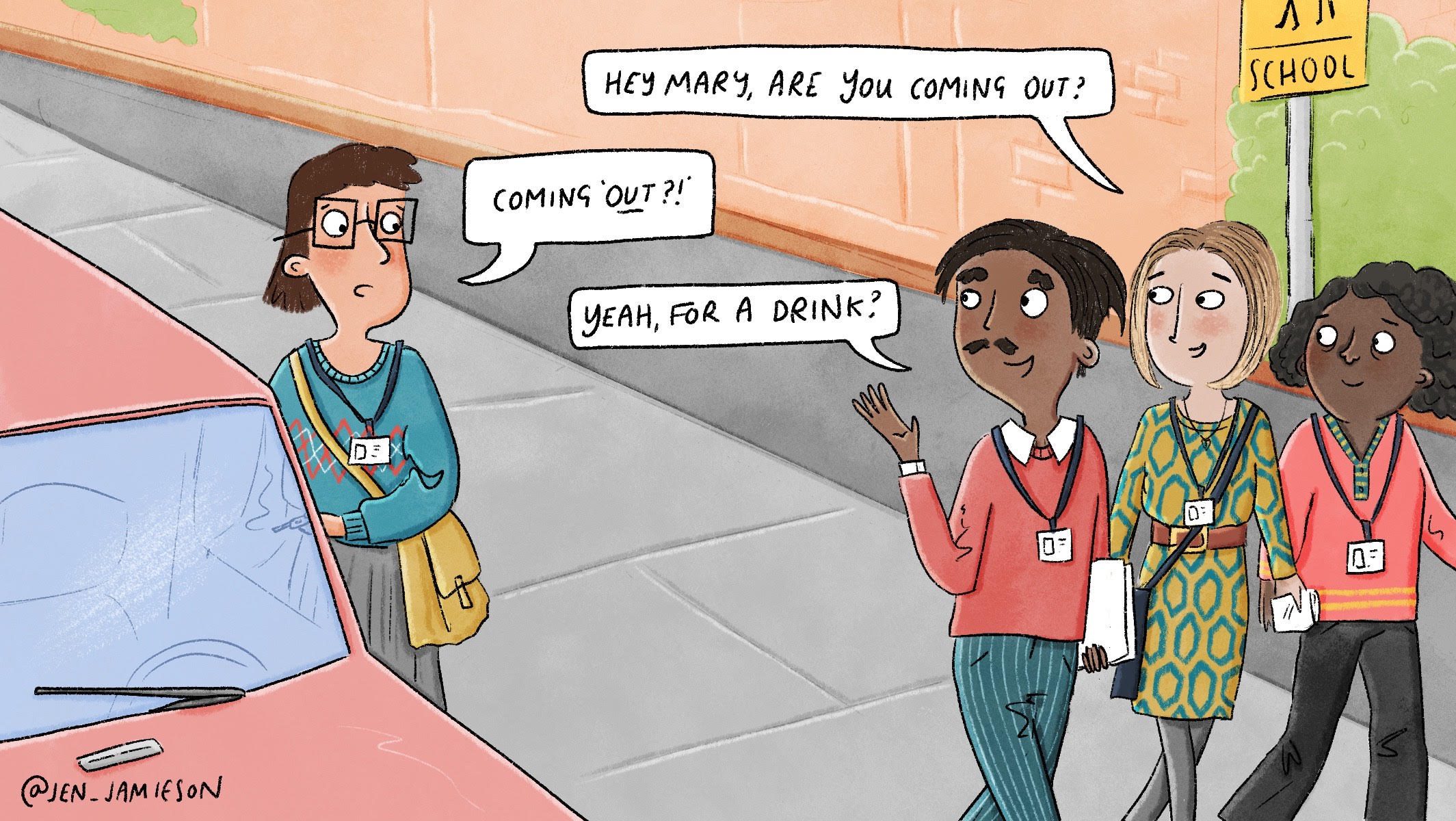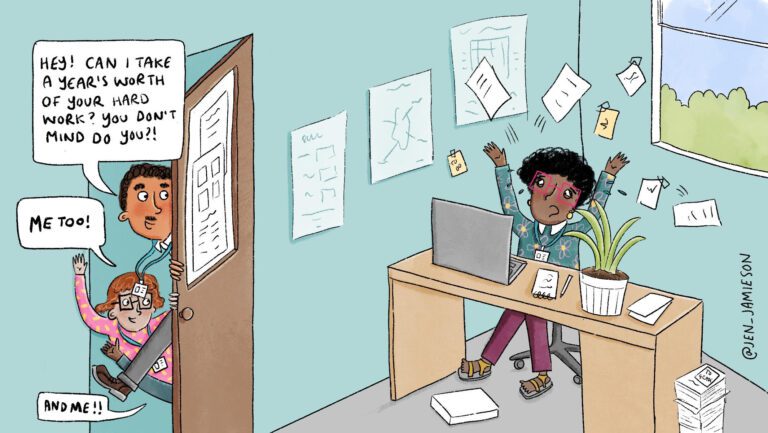Dear WeAreTeachers:
After relocating for my wife’s job over the summer, I’ll be teaching in a new district. I’m worried about coming out at my new school—especially with recent fearmongering about teachers’ agendas—to students or coworkers. It’s not as if I’m planning on announcing that to my students (in the same way a straight teacher wouldn’t announce it to their students), but I can think of plenty of times I spoke about my wife at my last school without issue. Part of me thinks I shouldn’t even tell coworkers I’m gay. Should I just plan to keep that part of my identity a secret? —Prejudice re: Pride
Dear P.R.P.,
I’m so sorry that you’ve found yourself in the position of weighing the risks of being yourself at your new workplace. Straight people can have a photo of their spouse on their desk, talk about the trip they took with their spouse to a coworker, or have their spouse visit on career day without worrying they will be charged with grooming or indoctrinating. The hypocrisy of fearmongers on this subject is egregious.
I think it’s important to let queer educators advise you on this question. Here are two perspectives from sources I trust:
“I taught in the southwest suburbs of Chicago for 6 years. Having started teaching at the age of 22, I was still in the process of coming out in my personal life so I didn’t tell coworkers at first.
“Last summer, I switched districts (now in the northwest suburbs of Chicago) to be able to take a leadership role while remaining in the classroom. I was able to start as an openly gay man in a relationship, and was met with grace, acceptance, and respect. It honestly let me know that I had found a special community to teach in.
“I understand the concern about being open, vulnerable, and true. However, in being visible to my students and their families, I know I have provided representation to those who identify as LGBTQ+ and those who come from LGBTQ+ families. So while it’s ultimately your decision that should be made for your safety, I think your true identity will be more embraced than it will be dismissed.”
—Daniel McNicholas, Chicago, IL (he/him)
“I’ve taught in a range of communities, and even in more liberal areas, this can be a fear. I’ve had supportive administrators and administrators who made me take down pictures of my wife I had on my desk. But the way I treat it is: if I were a man, would anyone question that I have a wife? Like on my first day of school when I show my intro ‘About Me’ slide, I’ll say, ‘Here’s a picture of me and my wife at Disneyland with my brothers. Here’s our two cats.’ And usually kids just want to know more about my cats.
“My biggest advice is join the union and talk to your rep to make sure you have an ally in your corner. A lot of this backlash and claims that we’re ‘pushing an agenda’ is making us out to be sexual deviants. If I’m talking about knitting a hat for my wife or playing Scrabble with her, I can hardly see why anyone would fault me for living the life of your average grandparent. Simply being queer doesn’t change that.
“When queer kids who might be afraid to come out can see us living normal, healthy lives, well, that’s the greatest lesson of all. I’ll get personal notes later from queer kids about how much it matters to them to see a queer adult alive and thriving. They need to know it gets better.”
—Cait Callaghan (they/them)
Dear WeAreTeachers:
I’m struggling with something big. I’m having a hard time understanding the point of school anymore. For the past few years, it seems like students have figured out how the system works. Kids pass to the next grade level whether they’re academically ready or not, resulting in freshmen who are functionally illiterate. They move virtually consequence-free through schools after breaking any rule short of physical assault. I’ve gotten to the point where I don’t even blame my students for not caring when there’s apparently no incentive for caring. What can I do—for them and for me? —I’m Too Young for This Existential Crisis
Dear I.T.Y.F.T.E.C.,
When we think about the burdens we carry as teachers all together, you’re right. It’s too much. It’s a broken system, and it’s functioning exactly the way its makers intended. Reflecting on all of it is enough to make anyone question why we return to the classroom.
It’s important to think about the big picture, to be sure. But it’s also helpful to zoom in and look at your work and your impact at the classroom level. The connections you’ve made. The incremental progress you’ve seen. The small moments—reacting with admiration to a student showing you their art, cracking up along with your class, that “look” when a student finally gets it. If you don’t already, keep a journal or binder to record those small moments. Add in any notes or print emails from students or parents. Return to this when you start to question whether what we do matters.
That being said, I know that a binder is not going to erase your existential dread about American education. The way we make change is by voting people into office who are willing to listen to teachers and reform policy in response to our feedback. If there’s not a politician like this in your area or state, maybe this is your chance to be the first. You’ll have my vote!
Dear WeAreTeachers:
I’m about to start my first year at a new campus (my sixth year of teaching overall). My daughter’s current daycare had to cancel her class indefinitely because of teachers not returning, so I had to scramble to find a replacement. After tons of searching, I found a place that had the holy trifecta of being on my commute, five minutes from school, and affordable on my single-mom budget (yay!). The problem is that it doesn’t open until 6:45, and my contract hours start at 6:45. How do I approach my principal without sounding like, “Hey, is it OK if I’m late every day?” —Daycareless and Confused
Dear D.A.C.,
As someone who has dealt with multiple daycare cancellations less than a month before our start date, I feel you. The pandemic has been hard on all of us, but I really feel for everyone in the daycare sphere right now—parents, kids with constant changes, but most of all our overworked and underpaid daycare teachers.
If your principal is both connected to the realities of the world in any capacity and has any degree of empathy, they will understand that this situation is out of your control. They should also appreciate your initiative in finding a replacement and be willing to work with you on finding a solution.
However, I understand your hesitation on presenting what feels like a pretty big ask to your supervisor at a totally new school. Something I’ve found helpful in navigating tricky situations with administrators is to show them what you’ve already tried and offer a proposed solution rather than just passing off a problem onto them.
For you, it might sound something like, “Hi Mrs. Green. Hope you’re doing well. I’ve got a tricky logistic situation on my hands. Ella’s current daycare announced this week they would have to cancel her class because of a sudden teacher shortage. I’ve been reaching out to several daycares in the area, but the only place without a wait list that works with my budget doesn’t open until 6:45, which is when my contract time begins for MHS. I was wondering if I could compensate for this 15-minute delay to my start time by adding 15 minutes to the end of my daily contract hours?”
I would be surprised (but also livid on your behalf) if an administrator didn’t work with you on this. It’d be a bold* move during a national teacher shortage to not bend over backward to try to keep you.
*And by bold, I mean bonkers.
Do you have a burning question? Email us at askweareteachers@weareteachers.com.
Dear WeAreTeachers:
I know it’s unpopular. I know it’s controversial. But I can’t help it! I hate sharing the resources I’ve created. I worked so hard for so many years to develop really amazing lessons with accompanying Google Docs, intricate breakout rooms, interactive Smartboard games, and other time-intensive learning resources. Last year I shared everything I had with my department and it was miserable. On top of my normal workload, I was constantly having to meet or email with teachers to clarify parts of the lesson or explain how a technology platform worked, fix broken links, or troubleshoot for them. This year we’ll have two new teachers on our team and I’m ready to cry at the thought of how much time I’ll lose in order to make their jobs a breeze. Is it terrible if I just claim to have lost all my lesson plans in a freak thumb-drive accident? —Little Miss Hoarder


